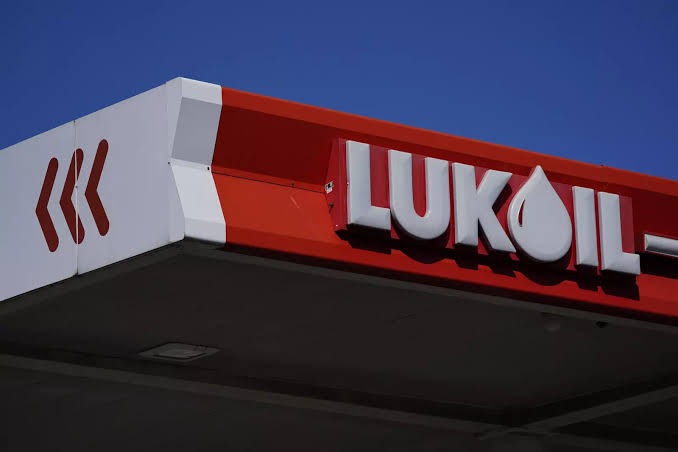Hungary and Russia are scrambling to resume oil deliveries from Lukoil PJSC following Ukraine’s imposition of tougher sanctions against the Russian oil giant. The heightened sanctions, enacted last month, effectively prohibit Lukoil from using Ukraine as a transit country for its products, a move that has significantly disrupted Hungary’s energy supply.
Ukraine’s Tougher Stance Against Lukoil
Mol Nyrt., the Hungarian energy company heavily reliant on Russian crude, is collaborating with Lukoil to find a legal solution to bypass these sanctions. Hungarian Foreign Minister Peter Szijjarto, after a meeting with Russian Foreign Minister Sergei Lavrov on the sidelines of a UN meeting in New York, stated, “There’s now a legal situation in Ukraine based on which Lukoil is not currently delivering to Hungary. Now we’re working on a legal solution.”
The sudden halt in supply underscores the critical nature of Hungary’s energy dependence on Russian oil. Lukoil, among several Russian firms, supplies crude to Hungary via the southern leg of the Druzhba pipeline in Ukraine. The sanctions have placed Hungary in a precarious position, forcing it to navigate a complex geopolitical landscape to maintain its energy security.
Hungary’s Response and Strategic Moves
Hungary’s response to the sanctions has been swift and multifaceted. The government in Budapest, under Prime Minister Viktor Orban, has sought exemptions from European Union energy sanctions to secure continuous energy supplies. Orban’s administration has intensified energy ties with Russia, securing several deals to boost natural gas deliveries despite the ongoing conflict in Ukraine and EU’s general stance against Russian energy dependencies.
Foreign Minister Szijjarto’s recent diplomatic efforts highlight Hungary’s proactive stance in addressing the energy crisis. His meeting with Lavrov followed Prime Minister Orban’s visit to Moscow earlier this month, where discussions with Russian President Vladimir Putin centered on how to end the war in Ukraine and secure energy supplies for Hungary.
EU partners have rebuked Orban for his diplomatic engagements, accusing him of using Hungary’s rotating presidency of the bloc for initiatives that do not reflect the collective stance of the EU’s 27 member states. This internal EU discord illustrates the complexities Hungary faces in balancing its national energy needs with broader EU policies and geopolitical pressures.
The Future of Energy Security in Hungary
Looking forward, Hungary must devise robust strategies to mitigate the impact of Ukraine’s sanctions on Lukoil. The Hungarian energy sector, particularly Mol Nyrt., faces a daunting challenge in substituting Russian crude oil. Fitch Ratings has indicated that while Mol currently relies on Russian supplies for two-thirds of its crude oil, it estimates that it will be able to fully substitute them from 2025.
Navigating EU Sanctions: Slovakia and Hungary’s Diplomatic Moves in the Russian Debate
The immediate need for alternative energy sources is pressing. Hungary’s reliance on the southern Druzhba pipeline for oil deliveries has been critically highlighted by the current sanctions. The government’s strategy includes not only securing exemptions and diplomatic solutions but also accelerating investments in renewable energy and exploring other non-Russian oil suppliers to diversify its energy mix.
Szijjarto emphasized the urgency of the situation, noting that Hungary’s energy security hinges on resolving the legal and logistical barriers posed by Ukraine’s sanctions. The ongoing efforts to find a legal workaround are crucial for preventing potential energy shortages and economic repercussions.
Serbia Reaffirms Solidarity with Ukraine but Refrains from Sanctions Against Russia
Ukraine’s hardening of sanctions against Lukoil has thrust Hungary into a significant energy crisis, illustrating the broader geopolitical tensions in the region. The sanctions are part of Ukraine’s broader strategy to counter Russian influence and pressure countries dependent on Russian energy to reassess their alliances and energy policies.
Hungary’s immediate priority is to restore its energy supply while navigating the complex dynamics of EU policies and Russian relations. The efforts by Mol and Lukoil to find a legal solution, combined with Hungary’s diplomatic engagements, reflect the urgent need for a balanced approach that ensures energy security without alienating EU partners.
EU Secures Provisional Agreement for Ukraine’s Defense Aid from Frozen Russian Assets’ Proceeds
In the long term, Hungary’s strategy must include significant investments in energy diversification to reduce dependency on Russian oil. The push towards renewable energy and alternative suppliers will be crucial in building a resilient energy infrastructure capable of withstanding geopolitical shocks.
NATO’s 2.7 Billion MK Airbase Project Near Ukraine and Crimea is Strategic Stronghold in Europe
As the situation evolves, Hungary’s actions will be closely watched by both its EU partners and the international community. The outcome of these diplomatic and strategic efforts will not only determine Hungary’s energy future but also set a precedent for how European countries can navigate the intricate web of energy security in a geopolitically volatile environment.



